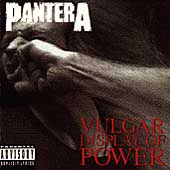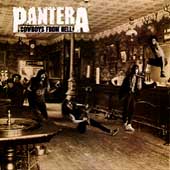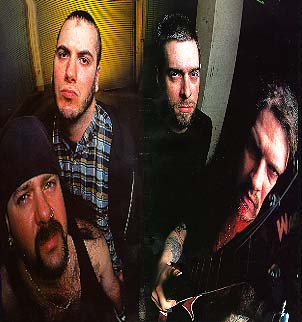

|
|
|
|
|
|
|
|
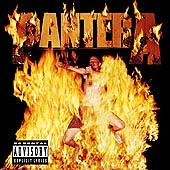
But Pantera is not about slick graphics or revealing insights into the human condition. Leave that shit to Rush. Pantera is first and foremost about the music, forging a metallic groove as goddamn catchy as it is abrasive. Reinventing the Steel is evidence that they achieve this integral balance once again and - here's the kicker - just might be doing it better than they ever have done.
Far be it from me to take anything away from past efforts. Far Beyond Driven is still my favorite Pantera release. Vulgar still has some of the strongest singles. But from Cowboys from Hell through The Great Southern Trendkill, each album has had its ebbs and flows, its lulls that are, quite frankly, of minimal interest to me. In other words, each release has been little more than a collection of singles, three to five standout tracks walled in by unimaginative filler whose sole existence is to constitute disk space.
Reinventing the Steel, thankfully in this regard, deviates from its predecessors, unleashing upon the world a more streamlined, pedal-to-the-metal Pantera. The songs are straightforward. Shorter. But of greater importance, the album as a whole gels unlike any of its previous efforts. In fact, since I bought it one week ago today, I have not once skipped a track, preferring to savor each and every one. Sure, I have my favorites, such as the opener "Hellbound" - a "Cowboys from Hell 2000," if you will - and "Goddamn Electric" - another candidate for a snicker - as well as "Death Rattle" and "Uplift." As I alluded to earlier, however, there is no filler to be found. None. Just straightforward heavy metal, Texas style.
I wouldn't say that
Pantera has reinvented the wheel - or the "steel," for that matter - with
this release. They have fine tuned the formula that has worked so well
for them, however, to reveal a leaner, meaner Pantera that I believe will
stand out as one of the premier releases of 2000.
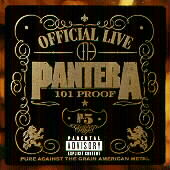

This impression is certainly not fueled by nostalgia. I did not lose my virginity on the dusty, cracked seat of its cramped quarters, if that's what you're thinking. To make a long story short, the truck was stone dead, a rotting metal carcass left to disintegrate on blocks in the front yard of a house a childhood friend of mine lived in. The only object associated with the truck that had not suffered from an intolerable amount of fading and rusting was the license plate affixed to the front bumper of the vehicle, and it is this simple, unimposing license plate that has epitomized the American South to me ever since. It read, "Save your Confederate money, boys. The South's gonna rise again."
And there you have it. The stereotypical Southern mentality in 10 simple words. Perhaps this is why the mere site of the Confederate "Stars and Bars" has a tendency to make me a bit uneasy, an icon of the ignorance, bigotry and sheer redneck fuckheadedness that those who enshroud themselves with it tend to illustrate.
Enter Pantera, whose members have always shown pride in their geographic origins, Texas and Louisiana. Despite my love and respect for the band, I must admit that I was at first a bit turned off by the band's increased embrace of Southern iconography on The Great Southern Trendkill for the aforementioned reasons. But then I began to consider it from a slightly different perspective. Perhaps it takes the notorious political irreverence of the South to rejuvenate "mainstream" (that is, non-extreme) metal and once again infuse it with a genuine antisocial attitude. And this they do with Trendkill, a violent and catchy manifesto documenting the band's role as the self-appointed slayer of trendites and alternageeks.
Perhaps the most accurate description I have read of this album came from Phil Anselmo himself, who dubbed it an amalgam of the best of the band's (post-glam) career, a grab bag of the Panteraisms which we've grown to love - solid grooves in which the band members lock into one another like a like-minded, well oiled machine (the closing couple of minutes of the album's closer, "Sandblasted Skin" is one shining example); the blastbeat-driven, abrasive and at times cacophonous riffage that was honed so well on Driven (check out the intro of the opener - the title track - and the caustic "Suicide Note, Part 2); and even those moments where the band slows down to a mid-tempo, churning crawl ("Drag the Waters," "Floods," and "10's" stand out in this regard).
What binds these disparate styles together into a cohesive whole, however, is the fleshing out and prevalence of yet another influence that has remained subsumed beneath the surface of the band's trademark sound up until this point: the good ol' boy, raunchy, Southern-fried rock-n-roll groove, like a souped up and muscularized Lynyrd Skynyrd. Redneck boogie, if you will. It appears as if it has finally dawned on the band that the general public is growing more accustomed to heavy music in general and heavy metal in particular, and instead of pushing its brand of metal to marginal extremes, as was the case in much of Driven, the band decided to go the other way, as if to say, "If we can't pummel you fuckers to death, we'll redneck the hell out of you."
Pantera is one of
those bands with the uncanny knack to stay one step ahead of its imitators
and detractors, and they have once again pulled of this feat with Trendkill.
Look at it as proof that the band members - gasp! - have perhaps matured
as musicians, showing the diversity within the metal genre of which the
band is capable. Or another way to throw for a loop those fraternity
types who have started siting Pantera as the house drinking band.
Regardless of how you perceive it, it is Pantera, and redneck or not, I
can live with that.
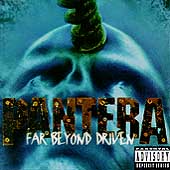
I can see where Lar's response can be read in two ways: (a) that Lars had purchased a plot of land on the moon and had moved there for a considerable amount of time - probably to hone his sadly average skills as a drummer in one of the greatest heavy metal bands of all time - thus rationalizing his ignorance of Pantera's resounding success both among and outside the metal charts; or (b) Lars, like many of Pantera's other detractors, was left a bit frazzled by the progression that occurred from Vulgar Display of Power to Far Beyond Driven. While the former was aggressive yet very accessible groove metal, the latter tended to assault and bludgeon the listener with its abrasive, machinelike riffs and screamed vocals. In short, Pantera stepped the metal up a notch to weed out the weak, to cleanse its fanbase of trendites who happened to treat "Walk" as a frat party drinking song.
The strategy worked. Lars was not the only critic of the band's intensified approach to aggressive music. An acquaintance of mine, who lost interest in Pantera following the release of this album, dubbed it "damn near unlistenable." The fans who appreciated the importance of this evolution, however, were assured that the mantle had indeed been passed, that genuine "metal up your ass" was now a Texas phenomenon and no longer had anything to do with its progenitors in the Bay Area. In fact, the phrase no longer fit. Although I mean absolutely no disrespect to Metallica, "Metal up your ass" worked well for a guitar emerging from a toilet, but when a giant drill is shown sodomizing an anonymous ass, as was censored from the album's cover, the rules, as well as the prepositions, change.
Far Beyond Driven, Pantera's third post-glam release, is intense. Crushing. Death and black metal it is not, but it does manage to forge its own extremes. One listen to the opening track, "Strength Beyond Strength," should quelch any naysayers. Phil Anselmo's simultaneously nihilistic and empowering vocals work abrasively well with one of the most brutal riffs Dimebag Darrell has ever executed. While the album is crammed full with monstrous riffs - check out "Use My Third Arm" and "Slaughtered" - it also contains some of the band's most accessible work to date, such as the album's three singles, "Becoming," "5 Minutes Alone" and "I'm Broken."
The album most certainly
is not flawless, however. For all of Dimebag Darrell's innovative
riffage, the album does tend to drag, with a number of the tunes clocking
in around or more than five minutes, which lends itself to quite a bit
of repetition. In addition - perhaps this is the leftist academic
in me coming out - misogeny in a few of the songs, most notably "Good Friends
and a Bottle of Pills," is not only problematic and bothersome, but, well,
passe. I guess it is Pantera's right if they desire to pass themselves
of as female-hating, abusive bastards, but neandrethal mentalities such
as this truly marr all constituents of the heavy metal scene.
The most curious
addition to the CD is the band's note-for-note remake of Black Sabbath's
"Planet Caravan." This change of pace appropriately placed at the
album's end is significant for two reasons: first, it serves as a
mellow prologue to ease the aural abuse undertaken by listeners who have
made it unscathed through the album. Second, and most importantly,
Pantera is implicitly stating that the future of metal must not come at
the expense of severing the roots of the past. While countless bands
bent on forging new ground attempt to burn ties with their predecessors,
desperately striving to create entirely original music in an acultural
vaccum - an impossibility - Pantera wears its influences on its sleeve,
reveling in the legacy of metal's founding fathers.
Far Beyond Driven is, without a doubt, my all-time favorite Pantera album: intense, insane and overpowering. It is, beyond all doubt, sheer, unadulterated metal - up, in, out and through your ass.
